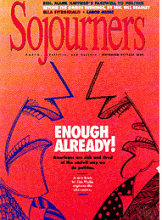The more than 30,000 women attending the 1995 Non-Governmental Organization (NGO) Forum and Fourth World Conference on Women in China shared a feeling of commonality. As a participant, I was struck daily by the ease with which women from completely different cultures and backgrounds came together to talk, work, and make connections with their sisters from around the world.
Women, whether from Islamic countries, Africa, India, or northern Europe, have the same goals for themselves and their daughters: to make a better life for women and girls. In her book Beyond Beijing, Joan Chittister articulates the experiences we shared there.
Chittister was a member of the Peace Train delegation, 230 women from 42 nations who traveled by train from Helsinki to Beijing. The train stopped in nine countries to link up with women's groups and hold discussions and seminars on issues they face. Alternating journal entries with articles she sent back for publication in the National Catholic Reporter, Chittister speaks to a universal experience. Her trip was a mix of heavy philosophical exchanges combined with daily humor and routine light maintenance—finding food, time to sleep, the right meeting place, and the fluctuating, but essential, ability to suspend Western logic—that will bring nods of recognition from those who were fortunate enough to have been in Beijing.
The formal result of the Beijing Conference was the Platform for Action, a long and unwieldy document identifying 12 areas of critical concern to the lives of women. The platform also provided specific actions to address these concerns.
Read the Full Article
